Who Loves Woke Wall Street?
Who Loves Woke Wall Street?
The Consumer Financial Protection Bureau isn't just protecting consumers, it may also be protecting conservatives. And conservatives need to wake up to that reality.
Welcome to BIG, a newsletter on the politics of monopoly power. If you’re already signed up, great! If you’d like to sign up and receive issues over email, you can do so here.
This piece continues a theme I’m fascinated by, which is the internal conflict within the Republican Party over corporate power. In this case, it’s about a lawsuit by Wall Street and Big Tech to have the Consumer Financial Protection Bureau, which is trying to stop banks from discriminating against customers, declared unlawful. If Wall Street is successful, they will be empowering banks to deny banking services to conservatives. And therein lies the possible tension.
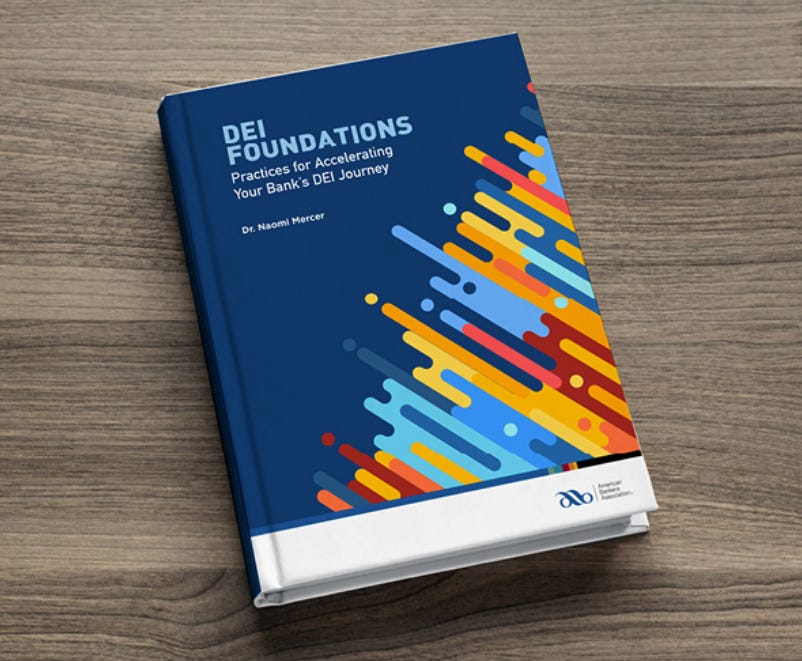
Take Tree Pose and Breathe
The other day, I sat down to read an important sociological work on tolerance and diversity, one of the endless books floating around to talk about conscious bias and unconscious bias, privilege, and so forth. I pulled some quotes, and they sound a bit like the best-selling book White Fragility, by diversity consultant and liberal superstar Robin DiAngelo. See if you can guess where they really came from.
"An ally is someone who transfers their privilege to someone who lacks that privilege. When we are willing to take on the struggles of others as our own, we are practicing allyship. Allyship is like yoga; it's not a label, it's a practice."
And another.
"Stop using Caucasian as a euphemism for White. The term Caucasian was popularized by a White supremacist anthropologist from the 18th century, whom I will not reference by name."
And another.
"This overlapping, interconnected aspect of identity is called intersectionality. Some of our aspects of identity are more privileged aspects in society than others, but we are all a mix of both privileged identities and disadvantaged ones."
And another.
"Another term that may be unfamiliar to some readers is "Latine." This term replaces Latino and Latina, which are problematic due to gender and the absorption of women's identity into male-centric groups."
Now that you’ve guessed, I’ll let you know the source. They are out of the American Bankers Association (ABA) book “DEI Foundations: Practices for Accelerating Your Bank’s DEI Journey.” The ABA is the most powerful trade association in banking, mostly representing dominant Wall Street firms, but with members across the board. Diversity, equity, and inclusion, or DEI as it’s known, is, according to the ABA President, now centered at every aspect of the organization.
I read this book because the ABA, along with the trade association representing Big Tech firms called the U.S. Chamber of Commerce, is suing a bank regulator to preserve Wall Street’s right to engage in discrimination. And it turns out we’re all in the cross-hairs. But before going into the substance, I’d like to throw one more delightful quote at you.
"Some days I am better at holding tree pose than others. Some days I am better than others at being an ally to someone who does not hold the same privileges as I do."
So as you read this issue, remember to breathe.
Diversity, Equity, and Delusion
For the last five years, conservatives have noticed that dominant private firms who control key infrastructure are willing and able to use their power to censor or exclude people from political participation. This was particularly obvious after January 6, when Facebook, Twitter, Google, and Amazon all proceeded to remove not only Donald Trump from their platforms, but targeted a broader swath of conservatives, including not just thousands of individuals, but firms like the social networking site Parler. Since then, they’ve realized that payment systems and banks target gun stores, data brokers sell location data about where social conservatives go to church, and firms like Blackrock force social policies on much of corporate America. Amazon and Disney, through mega-mergers, organize our culture, often, say, promoting content the Chinese government prioritizes.
This ability of private firms to discriminate offers no due process and no appeal. If VISA says you go out of business, you do. If JP Morgan says you can’t have a bank account, you can’t. And if Twitter says you can’t speak, you don’t get a Twitter account. And conservatives fear this problem will get a lot worse. TikTok is a major speech platform, and it is controlled by the Chinese Communist Party, the first such major platform from foreign actors that penetrated our society, but not the last.
Traditionally, this notion that the government should protect our rights has been a left-wing principle, but increasingly conservatives are internalizing it as they deal with very large and powerful firms that have coercive power. Here’s Republican Texas Attorney General Ken Paxton:

Crypto was one possible way out of this morass, but the collapse of those markets shows that crypto is, to put it politely, not ready for prime time. And this means the key entity that can protect conservatives from this onslaught of private sovereign power - the combined forces of JP Morgan’s Jamie Dimon, VISA, Google, the Chinese government, and Jeff Bezos - is the Federal government. That’s it. That’s why Justice Clarence Thomas has been saying that the Federal government has a right to police tech platforms, that our government should force these networks to block discrimination against people based on their political point of view. It’s why Texas passed a law saying the same thing about social media, why the 5th Circuit upheld it, and why the Supreme Court is now going to revisit key internet rules empowering Big Tech. It’s also why the Consumer Financial Protection Bureau asked firms like PayPal, which has de-platformed conservatives, for information on how it makes such decisions.
But there’s a problem. And that is, the populist right is running smack-dab into the libertarian view of the administrative state. For the last forty years, conservatives, who aligned with libertarians, feared overreaching Federal power, because they saw the U.S. government as a fundamental threat to their liberties. But the power of libertarian thinking is falling apart in right-wing circles for a number of reasons. Here is a clip of an event yesterday at the most prestigious libertarian think tank in D.C., the Cato Institute, in which an important participant describes the goal of having domestic manufacturing as a “macho fetish.” This clip has more than 600k views, and I’m told it went “off like a bomb” in Republican circles. (It also profoundly upset many left-wingers, as well as labor unions, FT columnists, and everyone in between.)

This kind of open disdain for having domestic supply resiliency and a middle class is crushing libertarianism as a coherent viewpoint, which is in many ways what Trump’s emergence represented. Nonetheless, political parties don’t flip on a dime, and the hundreds of Republican judges making decisions about the administrative state were confirmed before this shift in ideology. And so this has led to a situation where right-wing judges, even as some of them are now saying they want common carrier rules for key platforms, are also attacking the government agencies that could potentially create and enforce those rules. The Republican Party is populist in the streets, libertarian in the sheets.
Take a very simple example, Big Tech. The right, ostensibly, hates Amazon, Google, and Facebook. But they also can’t get themselves to support the government agency addressing these firms, because it’s run by a Democrat, Lina Khan. The Federal Trade Commission is investigating Amazon and has two antitrust suits against Facebook, one of which would force the firm to divest Instagram and WhatsApp and make censorship less likely. But conservative judges are right now hearing a complaint that the FTC itself is unconstitutional, and influential Congressman Jim Jordan is alleging Khan is recruiting Marxists to the agency and will use it to target conservatives on school boards.
Populist in the streets, libertarian in the sheets.
The Showdown: Can JP Morgan “Debank” Conservatives?
The FTC suit isn’t the only legal case in which conservative judges will hear arguments about the extent of Federal regulatory power, and be tempted to strike down the power of regulatory agencies who might actually put a check on Big Tech or Wall Street. A different one, financed by Wall Street and Big Tech in the financial realm, is perhaps more interesting.
The Wall Street Journal described the case as follows.
The U.S. Chamber of Commerce, American Bankers Association and four other trade groups Wednesday asked a federal court in Texas to stop the Consumer Financial Protection Bureau from looking for discriminatory behavior when conducting routine examinations of financial firms.
The ABA is the trade association I drew those annoying quotes from, and once again, we see the same pattern here. Attacking consumer-friendly bank regulators is a traditional Republican posture. After all, the CFPB was created in 2010 by Elizabeth Warren, a bogeyman of conservatives. However, Wall Street’s position is a problem for the new populist right that emerged in the Trump era, because the underlying fight is over whether this regulator has the authority to stop discrimination by banks. And while discrimination has traditionally been about race and gender, what social conservatives are realizing is that discrimination could target their political views.
Bankers have traditionally been free market types, but this too is changing. Now, particularly at the big Wall Street firms behind this suit, financial services leaders are prioritizing their right to set their own social policies, to act as a proxy government in ways social conservatives do not like. As I noted, the ABA has an entire guidebook and program to help banks implement and expand Diversity, Equity, and Inclusion initiatives. This ain’t your local banker fighting the big government types anymore, it’s Wall Street seeking to govern your local community, your credit-dependent business, and your city’s ability to borrow money.
Along with allies at Google, Amazon, Apple, and Meta, the banking sector, which is now far more concentrated (and not local) than it has ever been, is attacking the government. Here, for instance, is Neil Bradley, of the U.S. Chamber of Commerce, going after the CFPB.
“The CFPB is pursuing an ideological agenda that goes well beyond what is authorized by law.” The CFPB’s updated guidelines are “creating legal uncertainty that will result in fewer financial products available to consumers.”
Bradley, of course, is also a key operative fighting against bipartisan antitrust bills designed to constrain Big Tech. Here he was last September when those bills were introduced.
“This is a deeply flawed proposal that will upend the rules of the road that have made the U.S. the envy of the world when it comes to innovation and growth.”
The U.S. Chamber ‘key-voted’ the antitrust bills that passed last week, which means it uses that vote as a mechanism to see which members of Congress to support and oppose. In other words, the same people attacking a bank regulator trying to stop discrimination are also attacking legislation to constrain Big Tech. And there’s a reason for this.
Last year, the CFPB sought to get a handle on how Big Tech is going to use the payments system to engage in abusive conduct. Amazon, Google, Apple, all are becoming payments companies. This change surfaces some key policy questions. How do Big Tech firms plan to use data as they get into banking? How do they plan to disqualify or delist individuals and businesses? Will they ban businesses and individuals from their payments network the way Google demonetizes controversial figures on YouTube or the way Amazon handles certain books? As the Independent Community Bankers Association and the conservative American Principles Project told the CFPB, the potential for the abuse of market power by technology firms in the payments system is concerning.
A little less than a year later, the Bureau updated its bank supervision and examination manual on how it regulates banks. This manual is a sort of guidance document for banks, and tells them what regulators are going to be looking at and how they will be conducting examinations. In that manual the CFPB said that discrimination against customers or businesses might be an unfair or abusive act, so banks should pay attention to what kinds of discriminatory practices they engage in. The CFPB was explicit that some forms of discrimination are not covered by the Equal Credit Opportunity Act, but could still fall under the Bureau’s regulatory authority to bar unfair or abusive conduct. Though the CFPB didn’t say this, things like refusing to open a bank account for a conservative because of what he or she said or did in the political arena could fall under such prohibited behavior.
The goal of Big Tech and Wall Street is to kill the regulator seeking to put a check onto either. They don’t want Google blocked from going into payments, and they want to preserve JP Morgan’s power to refuse banking services to whoever it chooses.
The hostility to anti-discrimination rules is no longer just a left-wing concern. While discrimination has a certain historical connotation around race and gender, it can include everything from a bank choosing to tell a gun store owner than he or she can’t have a bank account for political reasons to blocking a potential rival from getting access to banking services to refusing to allow a certain transaction in the payments system because the consumer or business proprietor is an African-American.
These are not theoretical examples. Banks have in the past used their power over banking services to harm non-bank rivals, and there are many historical examples of anti-black practices in banking, which led to the passage of laws in the 1970s to bar such behavior. Conservatives are now facing this onslaught of power as well. In 2019, there was circumstantial evidence that JP Morgan “debanked” far-right activists, and there is increasing concern today that this kind of behavior will continue.
Last month, conservative activist Rachel Bovard gave a widely circulated speech at the National Conservative Conference teasing out these tensions. In it, she noted how building a coherent conservative governing apparatus means more than winning arguments on social media. “It doesn’t matter if we ‘own the left,’” she said, “if the left still ‘owns’ Wall Street, K Street, Pennsylvania Avenue, Silicon Valley, the Pentagon, the media, the academy, public health and hospitals, law enforcement agencies, and executive branch bureaucracies from the State Department to public libraries.” I bolded Wall Street and Silicon Valley, because that’s key.
Right now, as the libertarian corporate movement on the conservative side works through the American Bankers Association and the U.S. Chamber of Commerce, it is in effect operating at cross-purposes to the only entity - the Consumer Financial Protection Bureau - that is likely stop conservatives from being de-banked. Another way to put it is that if key private infrastructure requires ‘common carriage’ obligations, conservatives are going to need an administrative state to write and enforce rules around common carriage. In a world without public regulators, which is what libertarians want, discrimination against conservatives is legal. Regulation doesn’t go away, it’s just that Mark Zuckerberg or Jamie Dimon become the regulators, and the administrative apparatus becomes the Diversity, Equity, and Inclusion or Environmental, Social, and Governance compliance program.
Now, I’m on the left, so I don’t necessarily have the same view of DEI and ESG programs that pervade Wall Street. From my perspective, banks and Big Tech firms who emphasize DEI/ESG are often doing branding, not meaningful attempts to redress racism or pollution. While they can have some side benefits, this movement tends to bureaucratize American commerce and justify the arbitrary whims of concentrated power.
DEI programs, though they are generally very annoying, also fail to deliver on what they portend to deliver on. For example, Bank of America has a “supplier code of conduct,” in which it mandates that all of their suppliers recruit a diverse set of employees and publicly disclose their workforce gender and racial breakdown, which is intended to promote tolerance. Only, Bank of America regularly engages in racist behavior, like calling the cops on a black man who was simply trying to cash an insurance settlement check, or having Black Panther director and multi-millionaire Ryan Coogler arrested for trying to withdraw money from his bank account. Rather than dealing with being too big and badly managed, Bank of America instead forces its suppliers and employees to deal with annoying DEI webinars and paperwork.
This is true, more or less, for all of the big banks.
JP Morgan might claim that “Diversity is an imperative — and together, we are all accountable for our culture of respect, equity and inclusion.” Citibank might require compliance reports for all suppliers on diversity initiatives. And Wells Fargo might have beautiful photos on their programs. But the reality on the ground is quite different. I won’t run through the litany of scandals, but I’ll just highlight a very simple one. Alone among banks, Wells Fargo turned down more black homeowners for mortgages than it accepted, rejecting applications from people like Mauise Ricard III, a Microsoft engineer with an 800 credit score who is married to a doctor.
In other words, diversity exercises pushed by banks are often check-box exercises, but don’t address the underlying social problems they are intended to address. Meanwhile, large financial institutions may also be discriminating against lawful behavior by conservatives, and wielding their social power in destructive ways.
So while this lawsuit is ostensibly about ensuring banks don’t have to deal with anti-discrimination rules, it’s really about a question. Who governs? Either way, there are going to be rules around discrimination. The question is whether those rules are done through an administrative apparatus in the government over which we the people and our elected leaders have some influence, or in a board room in New York City where decision-makers are influenced by certain stakeholders in cosmopolitan cocktail parties pushing DEI programs.
There is alignment between the populist left and the populist right in this area. If banks and Big Tech firms are going to profit by operating as common carriers, they should not be able to discriminate and wield social power in doing so. Right now, the U.S. Chamber of Commerce and the American Bankers Association are leveraging old arguments from the libertarian right about how the government is impinging upon our liberty. But the reality is that this is no different than Google saying it has a right to censor us for our own good. If a bank closes down a conservative’s account engaged in lawful behavior, it’s discrimination, just as it’s discrimination when a bank manager refuses to offer services to a black man because he’s black.
We have laws and regulations against such things, and bank regulators enforce these laws for good reason. But as the ABA tries to upend the entire legal framework that could protect conservatives, Wall Street and Big Tech are hoping that the right doesn’t notice.
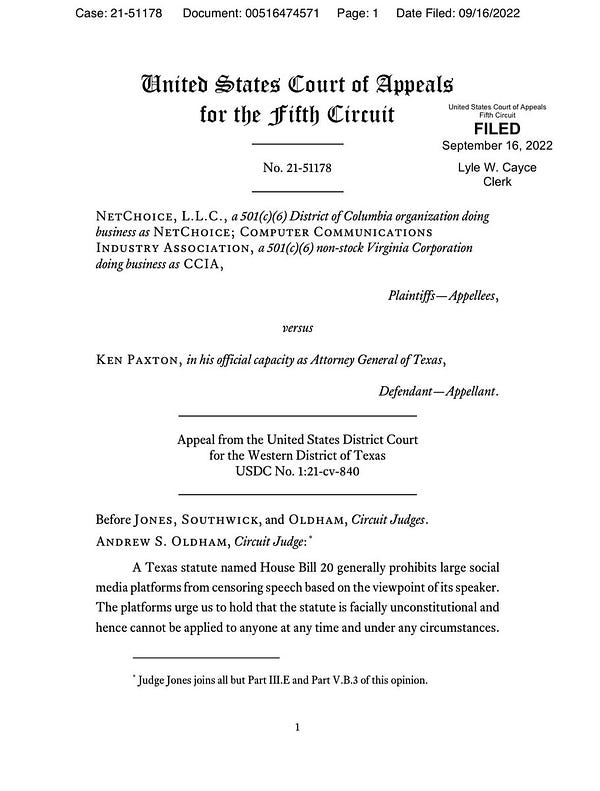
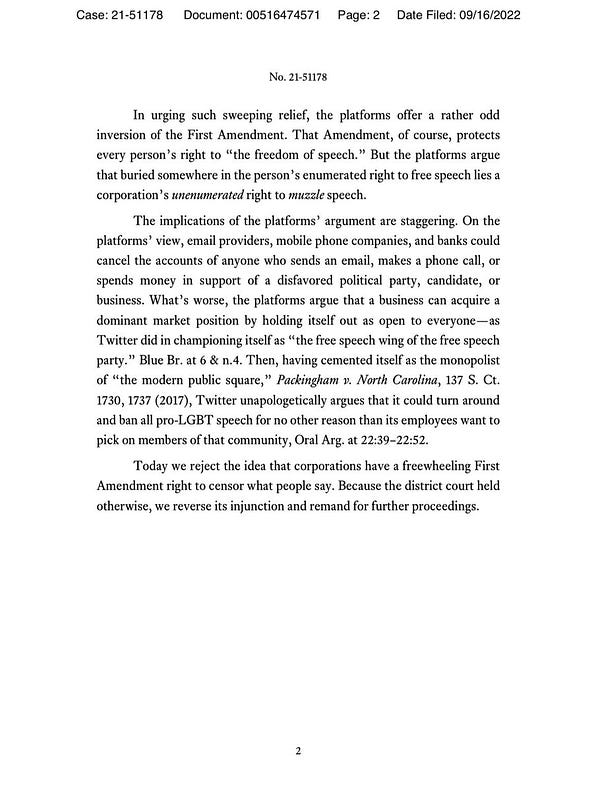
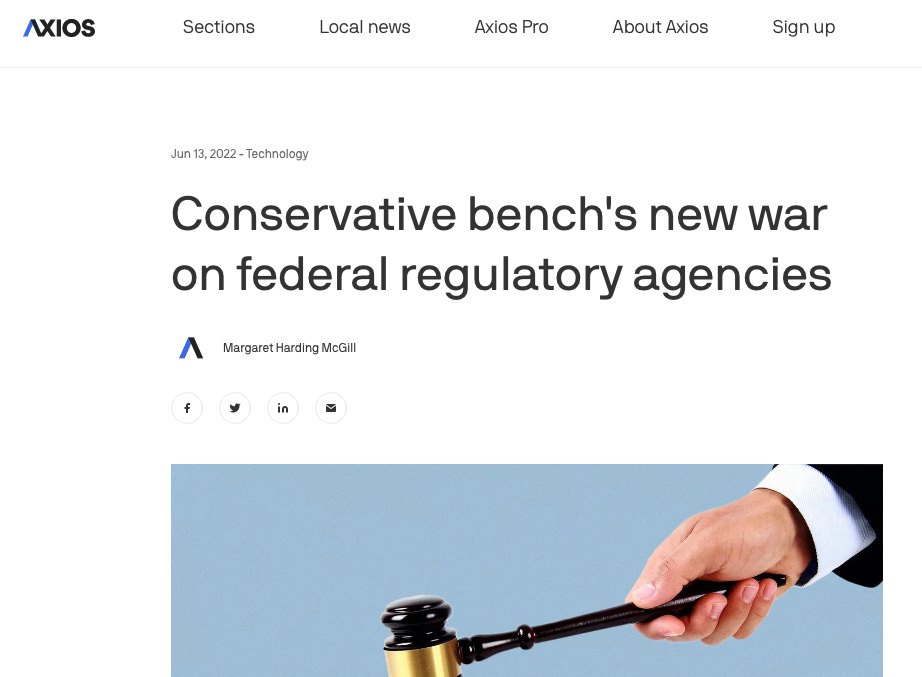
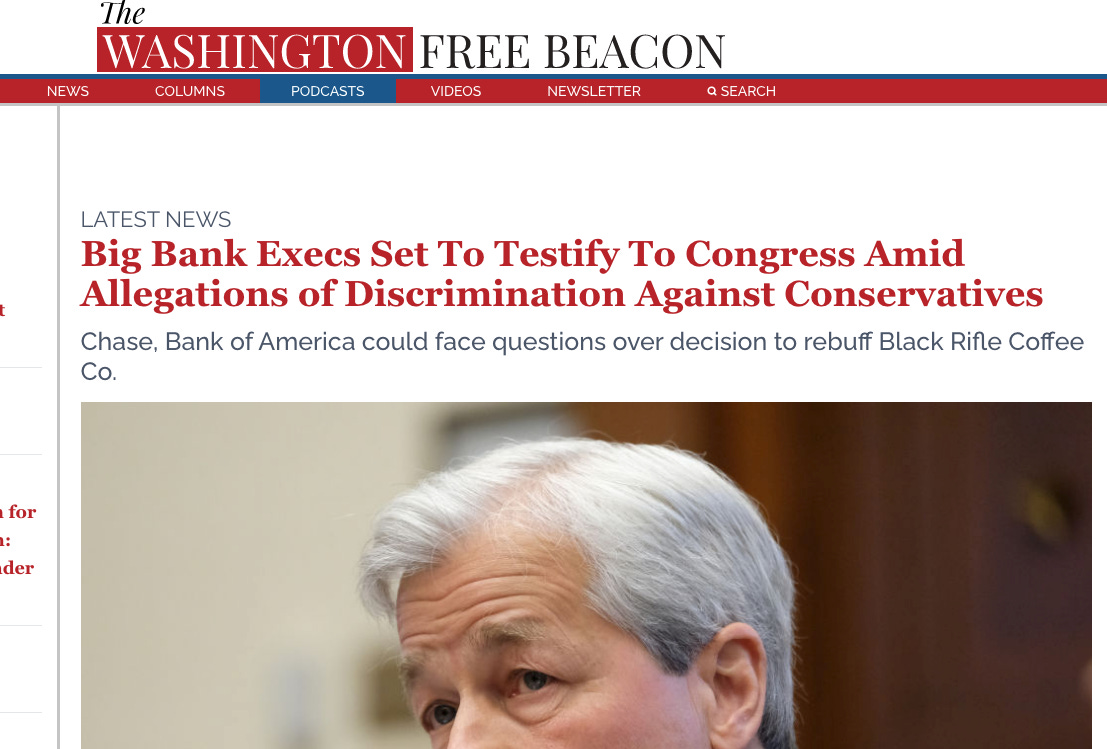
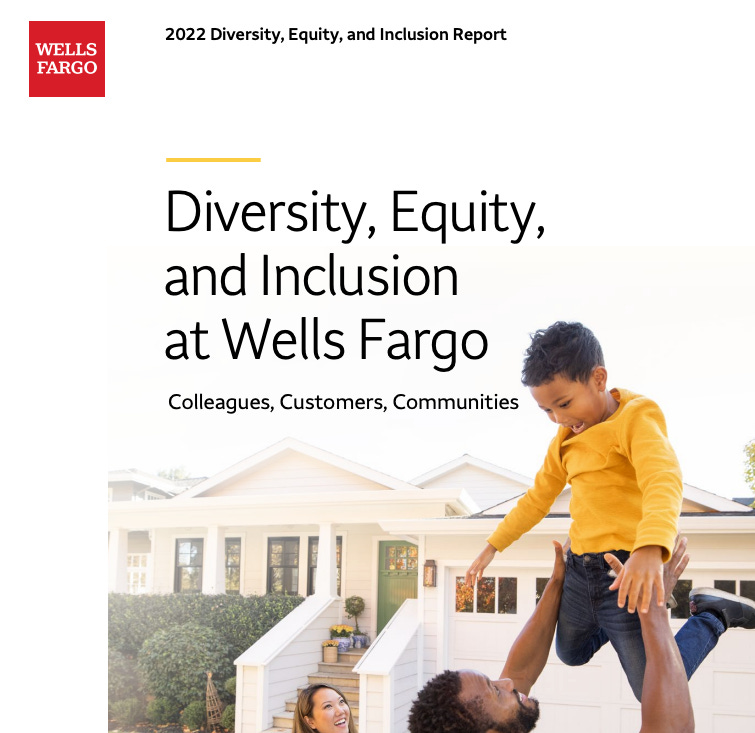
Comments
Post a Comment